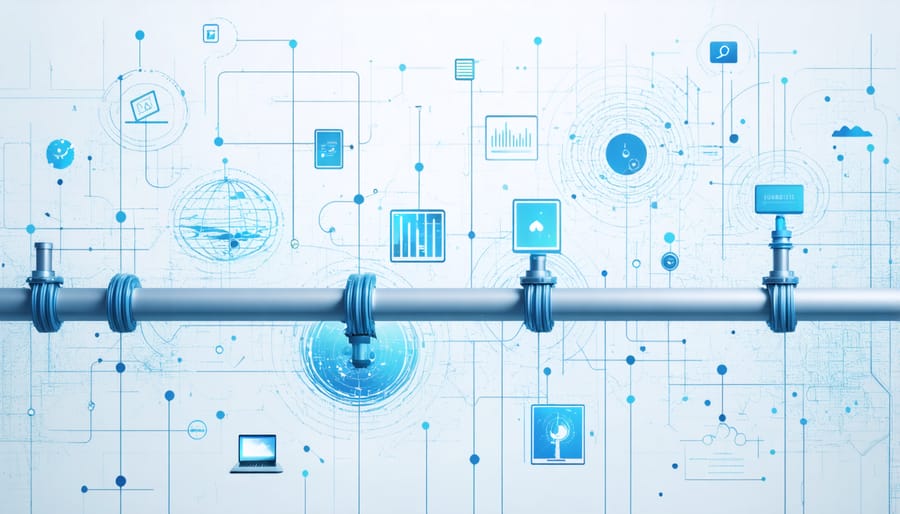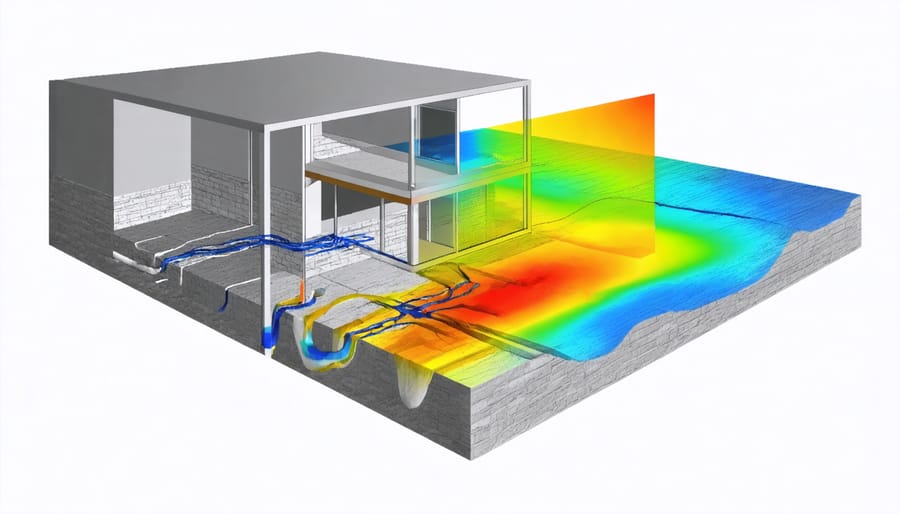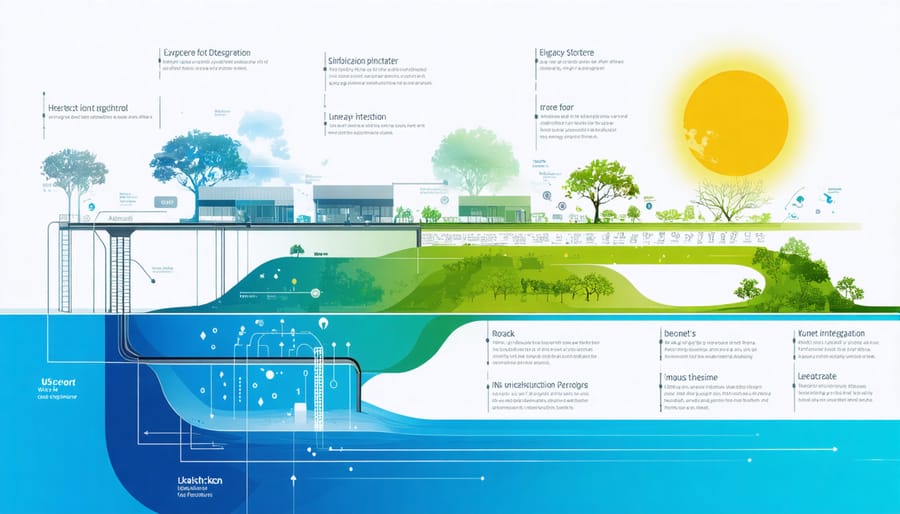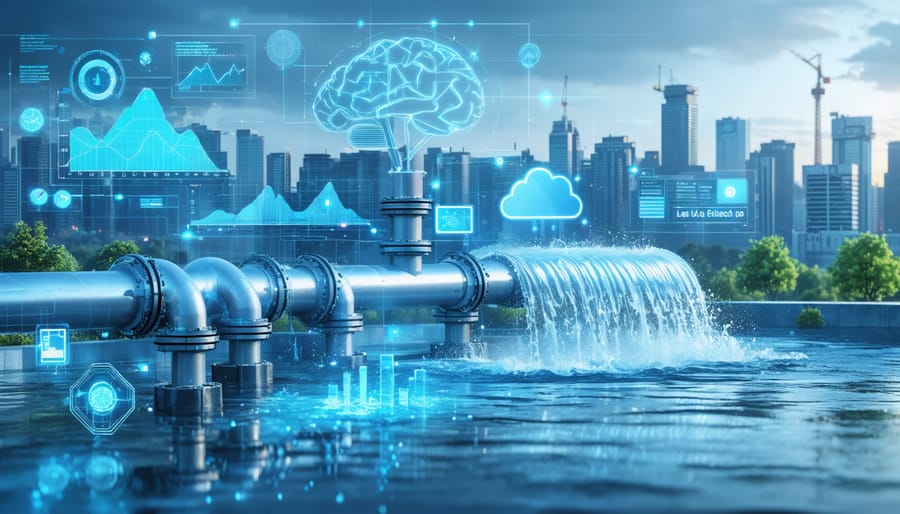Smart water technology represents a transformative shift in how we manage and optimize modern water infrastructure, combining advanced sensors, real-time analytics, and automated systems to revolutionize water management in urban environments. This integrated approach enables unprecedented control over water distribution networks, leak detection, quality monitoring, and consumption patterns across commercial and industrial facilities.
By leveraging Internet of Things (IoT) devices, artificial intelligence, and cloud computing, smart water systems provide infrastructure managers with actionable intelligence that drives operational efficiency, reduces waste, and ensures regulatory compliance. These technologies transform traditional water infrastructure into responsive, self-monitoring networks capable of predictive maintenance and automated problem resolution.
For construction professionals and facility managers, smart water represents a crucial advancement in building system optimization, offering real-time visibility into water usage patterns, immediate alert systems for potential issues, and data-driven insights that inform strategic planning and resource allocation. This technology stands at the forefront of sustainable urban development, promising significant improvements in water conservation, cost reduction, and environmental stewardship.
What Makes Water ‘Smart’: Core Technologies and Components
IoT Sensors and Real-time Monitoring
Modern smart water systems rely heavily on sophisticated sensor networks and real-time monitoring capabilities, similar to IoT integration in smart buildings. These advanced sensor technologies form the backbone of intelligent water management, enabling continuous monitoring of crucial parameters such as flow rates, pressure levels, water quality, and consumption patterns.
Key sensor types deployed in smart water systems include ultrasonic flow meters, pressure transducers, water quality analyzers, and leak detection sensors. These devices communicate through secure wireless networks, transmitting data to centralized management platforms for analysis and response. Advanced algorithms process this information in real-time, identifying anomalies and potential issues before they escalate into major problems.
The monitoring capabilities extend beyond basic measurements, incorporating multi-parameter sensors that can detect chemical composition, turbidity, pH levels, and biological contaminants. This comprehensive monitoring approach ensures water quality compliance while optimizing distribution efficiency. Integration with SCADA systems allows operators to remotely monitor and control various components of the water infrastructure, from pumping stations to storage facilities.
Modern sensor networks also feature self-diagnostic capabilities, alerting maintenance teams to potential sensor malfunctions or calibration needs, ensuring data reliability and system integrity. This proactive approach to monitoring and maintenance significantly reduces operational costs while improving service reliability.

Data Analytics and AI Integration
Data analytics and artificial intelligence serve as the brain of smart water systems, transforming raw data into actionable insights for improved water management. Advanced algorithms process information from various sensors and monitoring devices, enabling real-time decision-making and predictive maintenance capabilities.
Machine learning models analyze historical data patterns to forecast water demand, detect anomalies, and optimize distribution networks. These systems can identify potential leaks before they become critical, predict equipment failures, and automatically adjust water pressure based on usage patterns.
AI-powered analytics platforms integrate multiple data streams, including weather forecasts, consumption patterns, and infrastructure status, to create comprehensive water management strategies. For example, smart meters combined with AI can detect unusual consumption patterns that might indicate leaks or unauthorized usage, while predictive analytics help utilities plan maintenance schedules more effectively.
Cloud-based platforms enable centralized data management and analysis, providing stakeholders with real-time dashboards and automated reporting capabilities. These systems can process millions of data points daily, offering insights for both immediate operational decisions and long-term planning.
The integration of Internet of Things (IoT) devices with AI analytics has revolutionized water quality monitoring, enabling continuous assessment of chemical composition, bacterial levels, and other critical parameters. This allows for rapid response to quality issues and more efficient treatment processes, ultimately ensuring safer water delivery while reducing operational costs.
Key Applications in Modern Construction
Leak Detection and Prevention
Smart water systems employ advanced leak detection and prevention technologies that significantly reduce water waste and infrastructure damage. These systems utilize a network of intelligent sensors strategically placed throughout the water infrastructure to monitor pressure, flow rates, and acoustic signatures in real-time.
Modern leak detection solutions incorporate machine learning algorithms that analyze data patterns to identify anomalies indicating potential leaks. These systems can detect issues ranging from minor drips to major ruptures, often before they become visible at the surface. Acoustic sensors detect the unique sound frequencies produced by water escaping pipes, while pressure sensors identify sudden drops that might indicate a breach in the system.
In addition to detection capabilities, smart water systems implement preventive measures through automated pressure management and predictive maintenance. When the system identifies unusual patterns or potential weak points, it can automatically adjust water pressure to reduce stress on pipes and notify maintenance teams for proactive repairs.
Case studies have shown that implementing smart leak detection systems can reduce water losses by up to 30% and extend infrastructure lifespan by 20%. For example, a major European city recently deployed acoustic sensors across its water network, resulting in the early detection of 85% of leaks before they caused significant damage.
Real-time monitoring platforms provide facility managers with detailed analytics and alerts through mobile applications and desktop interfaces. This immediate access to critical data enables quick response times and informed decision-making. The system can also generate comprehensive reports on water usage patterns, helping organizations optimize their water management strategies and comply with environmental regulations.

Resource Optimization and Conservation
Smart water systems excel at optimizing resource utilization through advanced monitoring and control mechanisms. These systems employ real-time data analytics and automated responses to reduce water waste, minimize energy consumption, and maximize operational efficiency across the water infrastructure network.
At the core of resource optimization is leak detection and management. Smart sensors continuously monitor pipeline pressure, flow rates, and water quality parameters, enabling immediate identification of potential leaks or system inefficiencies. Studies have shown that smart water systems can reduce water losses by up to 30% through early detection and rapid response protocols.
Advanced metering infrastructure (AMI) plays a crucial role in conservation efforts by providing detailed consumption data. This allows facility managers and operators to identify usage patterns, implement demand-based pricing strategies, and encourage responsible water consumption. Real-world implementations have demonstrated that AMI systems can lead to a 15-20% reduction in water usage through improved consumer awareness and behavior modification.
Energy efficiency is another key benefit of smart water systems. Intelligent pump scheduling and pressure management optimize power consumption while maintaining service quality. Variable frequency drives (VFDs) adjust pump speeds based on demand, reducing energy waste during off-peak hours. Case studies from major metropolitan areas indicate energy savings of up to 25% through smart pump optimization.
Weather forecasting integration enables proactive system adjustments, particularly beneficial for stormwater management and irrigation systems. Smart controllers can automatically adjust water distribution based on precipitation predictions, soil moisture levels, and seasonal variations, ensuring optimal resource allocation while maintaining infrastructure resilience.
These optimization capabilities not only conserve valuable resources but also generate substantial cost savings for utilities and end-users, making smart water systems an increasingly essential component of sustainable infrastructure development.
Implementation Challenges and Solutions
Infrastructure Requirements
Smart water systems require a sophisticated network of interconnected infrastructure components to function effectively. At the core of these systems are advanced sensing and monitoring devices, including smart meters, pressure sensors, and water quality analyzers. These devices form the foundation of comprehensive critical infrastructure protection for water systems.
The physical infrastructure must integrate seamlessly with digital technologies, requiring robust communication networks that enable real-time data transmission. This typically includes a combination of fiber-optic cables, wireless sensors, and cellular networks, all connected to centralized control systems. Advanced SCADA (Supervisory Control and Data Acquisition) systems serve as the nerve center, processing data and enabling automated responses to system changes.
Essential components include smart pumping stations equipped with variable frequency drives, automated valve systems, and pressure management devices. Storage facilities must be retrofitted with level sensors and quality monitoring equipment. Treatment plants require automation systems, chemical dosing controls, and advanced filtration monitoring devices.
Cloud computing infrastructure and secure data centers are crucial for storing and analyzing the vast amounts of data generated by these systems. Additionally, backup power systems, redundant communication networks, and cybersecurity measures must be implemented to ensure system reliability and protection against potential threats.
Integration with Existing Systems
Integrating smart water technology into existing infrastructure requires a strategic, phased approach that minimizes disruption while maximizing system efficiency. The process typically begins with a comprehensive assessment of current water infrastructure, identifying key points where smart sensors and monitoring devices can be installed without major system overhauls.
Retrofitting existing pipelines with smart meters and sensors can be accomplished through non-invasive installation methods, such as external mounting systems and clamp-on devices. These solutions allow for real-time monitoring without the need to break into existing pipe networks. Additionally, wireless communication protocols can be implemented alongside existing SCADA systems, creating a hybrid infrastructure that bridges traditional and smart technologies.
For older facilities, modular integration solutions offer a cost-effective pathway to modernization. These systems can be installed incrementally, allowing organizations to spread investments over time while gradually building toward a comprehensive smart water network. Key integration points typically include main distribution lines, pump stations, and treatment facilities.
Data integration platforms play a crucial role in harmonizing information from both legacy systems and new smart devices. Modern middleware solutions can aggregate data from various sources, including older analog systems and new IoT devices, providing a unified view of the entire water network. This approach ensures that organizations can maintain operational continuity while progressively advancing their smart water capabilities.

Future Trends and Innovations
The future of smart water management is rapidly evolving, driven by groundbreaking innovations and integration with other smart construction technologies. Advanced artificial intelligence and machine learning algorithms are being developed to predict water infrastructure maintenance needs with unprecedented accuracy, potentially reducing system failures by up to 30% in the next five years.
Blockchain technology is emerging as a game-changer in water quality monitoring and trading systems, enabling transparent and secure water rights management while ensuring data integrity throughout the distribution network. Industry experts predict that by 2025, over 60% of urban water utilities will implement blockchain-based solutions for enhanced security and efficiency.
Digital twins are becoming increasingly sophisticated, creating virtual replicas of entire water networks that enable real-time simulation and optimization. These models will allow operators to test various scenarios and responses to potential emergencies without risking actual infrastructure disruption.
The integration of 5G networks and IoT sensors is expected to revolutionize data collection and analysis capabilities. Ultra-low latency communications will enable instantaneous response to system changes, while advanced sensors will monitor water quality parameters previously impossible to measure in real-time.
Emerging technologies in membrane filtration and smart materials are showing promise in developing self-healing water infrastructure components. These materials can detect and repair minor damage automatically, potentially extending infrastructure lifespan by 20-30 years while reducing maintenance costs significantly.
Quantum sensors are being developed to detect contaminants at the molecular level, promising to revolutionize water quality monitoring. These sensors, combined with advanced analytics, will enable water treatment facilities to respond to quality issues before they become problematic.
Edge computing implementations are expected to enhance local processing capabilities, reducing response times and enabling autonomous decision-making at individual network nodes. This distributed intelligence approach will create more resilient and adaptive water management systems capable of handling increasingly complex challenges in urban water distribution.
Smart water systems represent a transformative force in modern construction and infrastructure development, offering unprecedented control over water resource management and operational efficiency. By integrating advanced sensors, real-time monitoring capabilities, and data analytics, these systems are revolutionizing how construction projects approach water management from planning through completion and ongoing operations.
The implementation of smart water solutions delivers measurable benefits across multiple fronts. Projects utilizing these technologies consistently report significant reductions in water waste, improved resource allocation, and enhanced compliance with environmental regulations. The ability to detect and respond to issues promptly has proven invaluable in preventing costly water-related incidents and minimizing downtime.
Looking ahead, smart water systems will become increasingly crucial as construction projects face mounting pressure to achieve sustainability goals and adapt to climate change challenges. The integration of artificial intelligence and machine learning capabilities promises even greater optimization potential, while improved sensor technologies will enable more precise monitoring and control.
For construction professionals and project stakeholders, embracing smart water technology is no longer optional but essential for maintaining competitive advantage and meeting evolving industry standards. The initial investment in smart water infrastructure consistently delivers long-term returns through reduced operational costs, improved resource efficiency, and enhanced project sustainability credentials.
As we move forward, the success of construction projects will increasingly depend on their ability to incorporate these intelligent water management solutions effectively. The future of construction is undoubtedly intertwined with smart water technology, making it an essential consideration for any forward-thinking construction professional.

